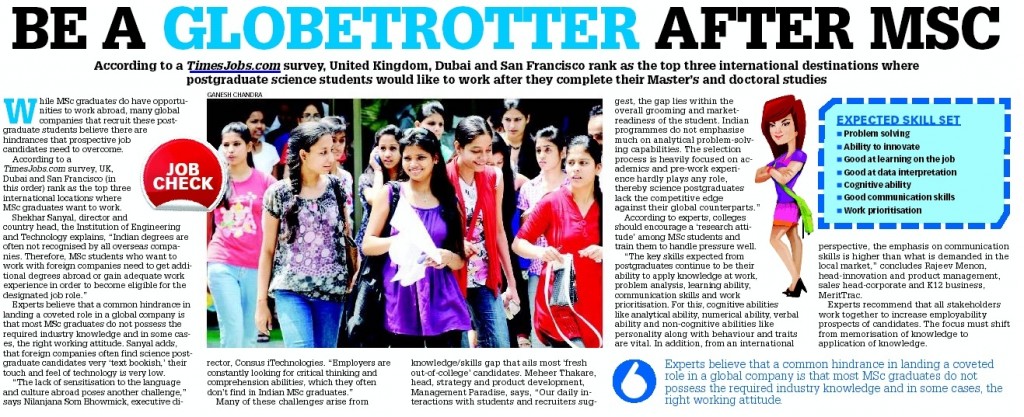According to a TimesJobs.com survey, United Kingdom, Dubai and San Francisco rank as the top three international destinations where postgraduate science students would like to work after they complete their Master’s and doctoral studies
While MSc graduates do have opportunities to work abroad, many global companies that recruit these postgraduate students believe there are hindrances that prospective job candidates need to overcome.
According to a TimesJobs.com survey, UK, Dubai and San Francisco (in this order) rank as the top three international locations where MSc graduates want to work.
Shekhar Sanyal, director and country head, the Institution of Engineering and Technology explains, “Indian degrees are often not recognised by all overseas companies. Therefore, MSc students who want to work with foreign companies need to get additional degrees abroad or gain adequate work experience in order to become eligible for the designated job role.”
Experts believe that a common hindrance in landing a coveted role in a global company is that most MSc graduates do not possess the required industry knowledge and in some cases, the right working attitude. Sanyal adds, that foreign companies often find science postgraduate candidates very ‘text bookish,’ their touch and feel of technology is very low.
“The lack of sensitisation to the language and culture abroad poses another challenge,” says Nilanjana Som Bhowmick, executive director, Consus iTechnologies. “Employers are constantly looking for critical thinking and comprehension abilities, which they often don’t find in Indian MSc graduates.”
Many of these challenges arise from knowledge/skills gap that ails most ‘fresh out-of-college’ candidates. Meheer Thakare, head, strategy and product development, Management Paradise, says, “Our daily interactions with students and recruiters suggest, the gap lies within the overall grooming and marketreadiness of the student. Indian programmes do not emphasise much on analytical problem-solving capabilities. The selection process is heavily focused on academics and pre-work experience hardly plays any role, thereby science postgraduates lack the competitive edge against their global counterparts.”
According to experts, colleges should encourage a ‘research attitude’ among MSc students and train them to handle pressure well.
“The key skills expected from postgraduates continue to be their ability to apply knowledge at work, problem analysis, learning ability, communication skills and work prioritisation. For this, cognitive abilities like analytical ability, numerical ability, verbal ability and non-cognitive abilities like personality along with behaviour and traits are vital. In addition, from an international perspective, the emphasis on communication skills is higher than what is demanded in the local market,” concludes Rajeev Menon, head-innovation and product management, sales head-corporate and K12 business, MeritTrac.
Experts recommend that all stakeholders work together to increase employability prospects of candidates. The focus must shift from memorisation of knowledge to application of knowledge.
Expected skill set
Problem solving Ability to innovate Good at learning on the job Good at data interpretation Cognitive ability Good communication skills Work prioritisation.




2 Comments